|
|
|
Sort Order |
|
|
|
Items / Page
|
|
|
|
|
|
|
| Srl | Item |
| 1 |
ID:
126068
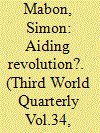

|
|
|
|
|
| Publication |
2013.
|
| Summary/Abstract |
This article explores the role of external actors in facilitating the uprisings in Egypt that have become known as the Arab Spring. It analyses several of the diplomatic cables released by the Wikileaks organisation that possess an Egypt focus. The article suggests that while the cables did not make surprising revelations to Egyptians, the release of this information offered a source of external legitimacy for the protesters by detailing a history of oppression and human rights abuses; conversely, the cables delegitimised the Mubarak regime. The data were then spread via different channels of communication to aid the protest movements both internally and externally. The article concludes by suggesting that while this information was incredibly important, as were the channels of communication used to facilitate events and spread the information, one must be careful not to diminish the importance of agency.
|
|
|
|
|
|
|
|
|
|
|
|
|
|
|
|
| 2 |
ID:
121489
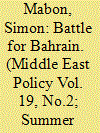

|
|
|
| 3 |
ID:
183248
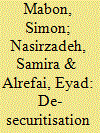

|
|
|
|
|
| Summary/Abstract |
Since 1979, relations between Saudi Arabia and Iran have oscillated between periods of overt hostility and apparent rapprochement, yet since 2003 the two have engaged in a vitriolic competition that has spread across regional affairs, to devastating effect in Lebanon, Syria, Bahrain, Iraq and Yemen. Central to much of this are efforts to securitise the other in the eyes of external audiences, discursively presenting the rivalry in the language of security. Yet despite their competing claims to Islamic legitimacy and leadership, there are strong pragmatic reasons related to political and economic concerns for the two states to engage with one another. Underpinning this, however, is a need for de-securitisation moves, reducing tensions between the two through framing relations in terms of ‘normal’ politics rather than the language of security.
|
|
|
|
|
|
|
|
|
|
|
|
|
|
|
|
| 4 |
ID:
165784
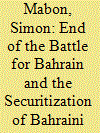

|
|
|
|
|
| Summary/Abstract |
Since protests shook Bahrain in 2011, the Saudi-backed regime there has embarked on a series of strategic moves, crushing dissent both at home and abroad. This article explores the methods the regime used to ensure its survival. It argues that by framing Bahrain's Shi'i majority as a security threat within broader regional challenges, the regime was able to solidify its core bases of support.
|
|
|
|
|
|
|
|
|
|
|
|
|
|
|
|
| 5 |
ID:
177692
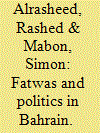

|
|
|
|
|
| Summary/Abstract |
Religious discourse has a fundamental impact on sectarian violence, stability and sovereignty across the Gulf region. Amidst an increasingly volatile political and social situation, fatwas serve as a prominent factor in the behaviour and beliefs of individuals and groups across the Gulf. Fatwas have long been a source of great interest in religious studies and international law yet very little work has been undertaken in politics. This article aims to analyse the impact of fatwas from Shiʿi and Sunni clerics in the promotion of sectarian violence across Bahrain in the aftermath of the Arab Uprisings. In this article, it will be argued that religious discourse has a significant impact in determining the nature of the political relationship between the components of society in Bahrain. We argue that fatwas serve a key role in regulating life across the island and, in the aftermath of the 2011 uprisings, in facilitating sectarian violence.
|
|
|
|
|
|
|
|
|
|
|
|
|
|
|
|
| 6 |
ID:
116298
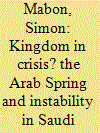

|
|
|
|
|
| Publication |
2012.
|
| Summary/Abstract |
While the revolutions of the 2011 Arab Spring deposed and replaced previously embedded autocratic regimes, the Kingdom of Saudi Arabia remained largely trouble free. This article examines how the ruling Al Saud family was able to prevent the violent manifestation of tensions within Saudi Arabia. It is argued here that through the process of state-formation mechanisms were created to ensure the stability of the regime, a framework initially intended to protect the regime from coup d'etats. The long-term application of coup-proofing strategies cannot successfully respond to the challenges emanating from non-military sources. This analysis concludes that the Saudi monarchy has avoided short-term instability, but longer-term pressures facing the Al Saud family necessitate domestic reform. However, regional dynamics, driven by fears of an expansionist, nuclear Iran, a changing regional balance of power, and an apparent American exceptionalism for Saudi Arabia, make this reform unlikely.
|
|
|
|
|
|
|
|
|
|
|
|
|
|
|
|
| 7 |
ID:
161479


|
|
|
|
|
| Summary/Abstract |
In recent years, the rivalry between Saudi Arabia and Iran has become increasingly influential in shaping the nature of Middle Eastern politics, with the two exerting influence across the region in an attempt to increase their own power and to reduce that of the other. Amidst an increasingly fractious region, this article explores Saudi Arabia’s attempts to securitize Iran to actors in the US. The signing of the nuclear agreement and the failure of the US to move beyond normal politics signal the failure of Riyadh’s efforts to securitize Iran. Understanding the nature of relationships in the region, particularly between Riyadh and Tehran and between Riyadh and Washington, helps to understand the changing nature of regional politics and ultimately, the emergence of a more pro-active Saudi foreign policy.
|
|
|
|
|
|
|
|
|
|
|
|
|
|
|
|
| 8 |
ID:
156619
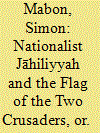

|
|
|
|
|
| Summary/Abstract |
This article argues that by understanding Islamic State of Iraq and Syria (ISIS) state-building processes we are able to understand how ISIS has developed while also developing a united citizenship body built from people in Iraq and Syria and those making hijra. The fragmentation of Iraq and Syria resulted in conditions that would prove conducive to the group's expansion and identifying these conditions is imperative to understanding Sunni extremism in the Middle East. The article argues that ISIS builds citizenship in two ways: first, by developing asabiyya—group feeling—among Sunni and second, by securitizing the Shi'a threat. Identifying and engaging with the concepts of sovereignty and citizenship helps to develop much stronger policy responses.
|
|
|
|
|
|
|
|
|
|
|
|
|
|
|
|
| 9 |
ID:
152988


|
|
|
|
|
| Publication |
London, I B Tauris, 2017.
|
| Description |
xiv, 232p.: ill.pbk
|
| Standard Number |
9781784536961
|
|
|
|
|
|
|
|
|
|
|
|
Copies: C:1/I:0,R:0,Q:0
Circulation
| Accession# | Call# | Current Location | Status | Policy | Location |
| 059070 | 363.325/MAB 059070 | Main | On Shelf | General | |
|
|
|
|
| 10 |
ID:
153140
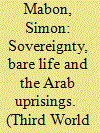

|
|
|
|
|
| Summary/Abstract |
Five years after people took to the streets in protest at political organisation across the Middle East, the consequences of these actions remain. As the protests gained traction, states began to fragment and regimes sought to retain power, whatever the cost. While a great deal of focus has been upon what happened, very little attention has been paid to the role of agency within the context of the fragmenting sovereignty and political change. This article contributes to these debates by applying the work of Giorgio Agamben to the post-Arab Uprisings Middle East, to understand the relationship between rulers and ruled along with the fragmentation of the sovereign state. The article argues for the need to bring agency back into conceptual debates about sovereignty within the Middle East. It concludes by presenting a framework that offers an approach building upon Agamben’s bare life.
|
|
|
|
|
|
|
|
|
|
|
|
|
|
|
|
| 11 |
ID:
168880
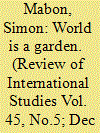

|
|
|
|
|
| Summary/Abstract |
Traditional approaches to questions about nomos in IR typically focus upon either its establishment and the formal structures that emerge through interaction within a clearly delineated spatial area, or an exploration of US hegemony in the post-2003 world. In this article I posit a different approach, building on the ideas of Giorgio Agamben, which grounds nomos as a spatialisation of the exception within conditions of neoliberal modernity. I suggest that within the global nomos are more localised nomoi. These localised nomoi are a consequence of the spatialisation of the exception and a fundamental tension between localisation and ordering. I argue that while sovereign power has been a source of contemporary scholarship, such explorations have paid scant attention to the regulatory power of normative values and their capacity to create order within space. Such norms allow for a greater awareness of how sovereign power can be mobilised in and of itself as a form of contestation. Locating such debates in the Middle East, I explore the concept of nomos to understand how struggle over the localisation and ordering of space helps us to better understand contemporary political life.
|
|
|
|
|
|
|
|
|
|
|
|
|
|
|
|
|
|
|
|
|